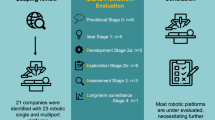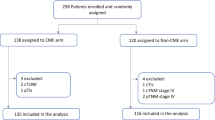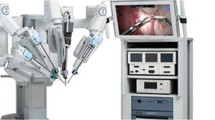Abstract
Background
Robotic surgery has gained popularity in surgical oncology. Rectal cancer surgery, known to be technically challenging, may benefit from robotics in achieving better mesorectal dissection and may contribute to improved perioperative outcomes. The objective of this study was to compare early experience in robotic surgery to conventional approaches with regard to clinicopathologic and economic parameters.
Methods
A retrospective review using a prospectively maintained database of rectal cancer surgeries performed at a tertiary cancer center from 2007 to 2013 was conducted. These resections included those performed via laparotomy, laparoscopy, and robotic-assisted operations. Perioperative demographic and tumor characteristics were collected, and short-term clinicopathologic outcomes were compared. Additionally, economic variables were evaluated for each patient’s episode of care.
Results
Seventy-nine cases were identified. Twenty-six were completed via open approach, 27 laparoscopically, and 26 via robotic assistance. Demographic characteristics were similar between all groups including age, gender, BMI, and Charlson score. Comparison of intraoperative characteristics showed a lower rate of conversion to laparotomy (12 vs. 37 %, p = 0.05), and lower estimated blood loss (mean 296 vs. 524 cc, p = 0.04), in the robotic group compared to laparoscopy or open resection. There was no significant difference in quality of total mesorectal excision and number of lymph nodes harvested between the three cohorts. Postoperative complication rate, mean length of stay, 30-day readmission, and 30-day mortality were comparable among the cohorts. Median cost per episode of care was lower in laparoscopic surgery ($11,493), compared to open ($12,558) and robotic approach ($18,273); p = 0.029.
Conclusions
The findings demonstrate similar perioperative and short-term outcomes between robotic surgery and conventional approaches. Robotic assistance is associated with decreased intraoperative blood loss and fewer conversions, albeit at an increased overall cost. Given these benefits, and as data and experience mature, future study is needed to fully define the value of the robotic approach.
Similar content being viewed by others
References
Guillou PJ, Quirke P, Thorpe H, Walker J, Jayne DG, Smith AM, Heath RM, Brown JM, MRC CLASICC trial group (2005) Short-term endpoints of conventional versus laparoscopic-assisted surgery in patients with colorectal cancer (MRC CLASICC trial): multicentre, randomised controlled trial. Lancet 365(9472):1718–1726
van der Pas MH, Haglind E, Cuesta MA, Fürst A, Lacy AM, Hop WC, Bonjer HJ (2013) COlorectal cancer laparoscopic or open resection II (COLOR II) study group. Laparoscopic versus open surgery for rectal cancer (COLOR II): short-term outcomes of a randomised, phase 3 trial. Lancet Oncol 14(3):210–218
Kanji A, Gill RS, Shi X, Birch DW, Karmali S (2011) Robotic-assisted colon and rectal surgery: a systematic review. Int J Med Robot 7(4):401–407
Kang J, Yoon KJ, Min BS, Hur H, Baik SH, Kim NK, Lee KY (2013) The impact of robotic surgery for mid and low rectal cancer: a case-matched analysis of a 3-arm comparison—open, laparoscopic, and robotic surgery. Ann Surg 257(1):95–101
Speicher PJ, Englum BR, Ganapathi AM, Nussbaum DP, Mantyh CR, Migaly J (2014) Robotic low anterior resection for rectal cancer: a national perspective on short-term oncologic outcomes. Ann Surg. doi:10.1097/SLA.0000000000001017
Park EJ, Cho MS, Baek SJ, Hur H, Min BS, Baik SH, Lee KY, Kim NK (2015) Long-term oncologic outcomes of robotic low anterior resection for rectal cancer: a comparative study with laparoscopic surgery. Ann Surg 261(1):129–137
Porpiglia F, Morra I, LucciChiarissi M, Manfredi M, Mele F, Grande S, Ragni F, Poggio M, Fiori C (2013) Randomised controlled trial comparing laparoscopic and robot-assisted radical prostatectomy. Eur Urol 63(4):606–614
Baek SJ, Kim SH, Cho JS, Shin JW, Kim J (2012) Robotic versus conventional laparoscopic surgery for rectal cancer: a cost analysis from a single institute in Korea. World J Surg 36(11):2722–2729
Author information
Authors and Affiliations
Corresponding author
Ethics declarations
Funding
No external sources of funding were used for this study or its publication.
Disclosures
Dr. Ramji, Cleghorn, Dr. Josse, Dr. MacNeill, Dr. O’Brien, Dr. Urbach, and Dr. Quereshy have no conflict of interest or financial ties to disclose.
Rights and permissions
About this article
Cite this article
Ramji, K.M., Cleghorn, M.C., Josse, J.M. et al. Comparison of clinical and economic outcomes between robotic, laparoscopic, and open rectal cancer surgery: early experience at a tertiary care center. Surg Endosc 30, 1337–1343 (2016). https://doi.org/10.1007/s00464-015-4390-8
Received:
Accepted:
Published:
Issue Date:
DOI: https://doi.org/10.1007/s00464-015-4390-8




